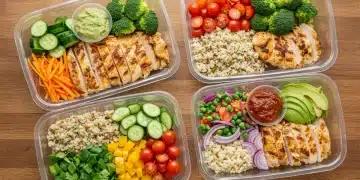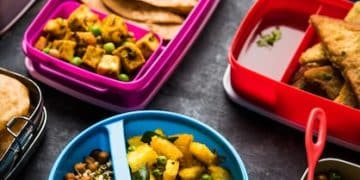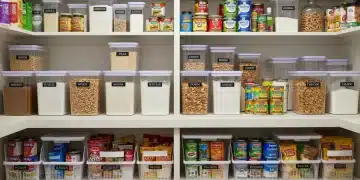The Art of Meal Planning: A Creative Culinary Adventure

The art of meal planning transforms a routine chore into a fulfilling creative culinary adventure, allowing individuals to proactively manage their nutrition and discover new flavors.
Is the art of meal planning just another chore on your to-do list? What if it could be a fun, creative way to explore new foods, save money, and eat healthier? Join us as we transform meal planning from a mundane task into a flavorful adventure.
Unleashing Your Culinary Creativity Through Meal Planning
Meal planning doesn’t have to be a rigid, restrictive process. Instead, it can be a playground for your culinary creativity. By embracing a flexible and imaginative approach, you can turn meal planning into an enjoyable and rewarding experience.
Let’s explore how to infuse your meal planning with a dose of creativity, making it a delightful journey of culinary discovery.
Embrace Theme Nights
Theme nights can inject excitement into your weekly meal plan. Consider dedicating each night to a specific cuisine or culinary style.
- Taco Tuesday: Experiment with different fillings, toppings, and salsas.
- Pasta Wednesday: Explore various pasta shapes, sauces, and protein pairings.
- Sushi Saturday: Learn to make sushi rolls at home or order from your favorite local sushi restaurant.
Explore New Recipes
Don’t be afraid to step outside your comfort zone and try new recipes. Browse cookbooks, food blogs, and online resources to discover exciting culinary creations.
Trying new recipes not only expands your culinary horizons but also prevents mealtime boredom.

By embracing theme nights and exploring new recipes, you can transform meal planning into a fun and creative adventure.
The Benefits of Meal Planning
Beyond the creative and culinary aspects, meal planning offers a multitude of practical benefits. Let’s delve into the advantages of incorporating a well-structured meal plan into your daily routine.
From saving time and money to improving your overall health, meal planning can be a game-changer.
Time Savings
Meal planning saves you valuable time during the week. Instead of scrambling to decide what to eat each day, you’ll have a clear plan in place.
This reduces the stress of last-minute meal decisions and eliminates the need for frequent trips to the grocery store.
Financial Benefits
Meal planning can help you save money by reducing food waste and impulse purchases. When you plan your meals, you’re more likely to buy only what you need.
- Avoid spontaneous takeout orders and restaurant meals.
- Reduce food waste by using ingredients efficiently.
- Take advantage of sales and discounts when planning your meals.
Improved Health
Meal planning empowers you to make healthier food choices. When you plan your meals, you can prioritize nutrient-dense foods and control portion sizes.
This can lead to improved weight management, better energy levels, and a reduced risk of chronic diseases.
Meal planning offers a wide range of benefits, making it a valuable tool for anyone seeking to improve their lifestyle.
Essential Tools and Resources for Meal Planning
To embark on your meal planning journey, you’ll need a few essential tools and resources. These aids can simplify the process and enhance your overall experience.
From planners and apps to cookbooks and online resources, let’s explore the tools that can empower your meal planning endeavors.
Meal Planning Planners and Templates
Consider using a meal planning planner or template to organize your meals for the week. These tools provide a structured framework for planning your meals and creating shopping lists.
- Physical planners offer a tangible way to visualize your meal plan.
- Digital templates allow for easy editing and sharing.
- Choose a format that suits your personal preferences and lifestyle.
Meal Planning Apps
Several meal planning apps can streamline the process and offer a wealth of features, such as recipe databases, automated shopping lists, and nutritional information.
These apps can be particularly useful for those with busy lifestyles or dietary restrictions.
Cookbooks and Online Resources
Cookbooks and online resources can provide inspiration and guidance for your meal planning journey. Explore a variety of culinary styles and dietary preferences to discover new dishes and techniques.

Having the right tools and resources can significantly enhance your meal planning experience, making it more efficient and enjoyable.
Strategies for Successful Meal Planning
While the tools and resources can assist you, implementing effective meal planning strategies is crucial for success. Let’s explore some tips and techniques that can help you achieve your meal planning goals.
From setting realistic goals to incorporating flexibility, these strategies can set you up for meal planning success.
Start Small and Set Realistic Goals
Begin with a manageable number of meals per week. Start by planning just a few dinners or lunches, and gradually increase the number as you become more comfortable.
Setting realistic goals prevents overwhelm and increases your chances of sticking to your meal plan.
Incorporate Flexibility
Life can be unpredictable, so it’s important to build flexibility into your meal plan. Allow for occasional meals or snacks outside of your plan to accommodate unexpected events or cravings.
Flexibility prevents meal planning from feeling too restrictive or burdensome.
Utilize Batch Cooking and Meal Prepping
Batch cooking and meal prepping can save you significant time during the week. Prepare large quantities of certain ingredients or entire meals on the weekend, and store them for later use.
This strategy is particularly helpful for busy individuals who struggle to find time for cooking during the workweek.
By implementing these meal planning strategies, you can overcome common challenges and achieve consistent success.
Tailoring Meal Plans to Specific Dietary Needs
Meal planning becomes even more essential when you have specific dietary needs or restrictions. Let’s explore how to tailor meal plans to accommodate various dietary requirements.
Whether you’re vegan, gluten-free, or managing a health condition, meal planning can help you meet your nutritional needs effectively.
Vegan Meal Planning
Vegan meal planning involves excluding all animal products. Focus on plant-based protein sources, such as legumes, tofu, and tempeh, as well as a variety of fruits, vegetables, and grains.
- Explore vegan cookbooks and online resources for recipe inspiration.
- Plan your meals around seasonal produce for optimal flavor and nutrition.
- Ensure you’re getting enough essential nutrients, such as vitamin B12 and iron.
Gluten-Free Meal Planning
Gluten-free meal planning requires avoiding foods containing gluten, a protein found in wheat, barley, and rye. Focus on naturally gluten-free foods, such as fruits, vegetables, rice, and corn.
Many gluten-free alternatives are available for common gluten-containing foods, such as bread, pasta, and baked goods.
Meal Planning for Health Conditions
Meal planning plays a crucial role in managing certain health conditions, such as diabetes, heart disease, and food allergies.
Work with a registered dietitian or healthcare provider to develop a meal plan that meets your specific medical needs.
By tailoring your meal plans to your specific dietary needs, you can ensure you’re meeting your nutritional requirements and supporting your overall health.
Overcoming Common Meal Planning Challenges
Meal planning can be challenging, especially when you’re first starting out. Let’s explore some common obstacles and strategies for overcoming them.
From a lack of time to limited culinary skills, many factors can hinder your meal planning efforts.
Limited Time for Planning
If you struggle to find time for meal planning, consider setting aside a specific time each week solely for this task. Even just 30 minutes can make a significant difference.
Utilize meal planning apps or templates to streamline the process and save time.
Lack of Culinary Skills
If you lack culinary skills, focus on simple and easy-to-prepare recipes. Start with basic dishes and gradually expand your repertoire as you gain confidence.
Consider taking a cooking class or watching online tutorials to improve your culinary skills.
By addressing these common challenges, you can pave the way for a successful and sustainable meal planning journey.
| Key Point | Brief Description |
|---|---|
| 🗓️ Planning Saves Time | Avoid daily “what’s for dinner” stress. Plan meals weekly for efficiency. |
| 💰 Budget-Friendly | Reduce food waste and impulse buys. Stick to your shopping list and save. |
| 🥗 Healthier Choices | Control ingredients and portions. Make nutritious meals a priority. |
| 💡 Get Creative | Theme nights and new recipes make meal planning fun and exciting. |
Frequently Asked Questions
▼
Meal planning involves organizing and scheduling your meals in advance. It’s important because it saves time, reduces stress, promotes healthier eating habits, and helps you stay within your budget.
▼
Start small by planning just a few meals per week. Choose simple recipes, create a shopping list, and gradually increase the number of meals you plan as you become more comfortable with the process.
▼
Incorporate theme nights, explore new recipes, and use colorful ingredients to make meal planning more engaging. Involve family members in the process to make it a collaborative effort.
▼
Research recipes and ingredients that align with your dietary requirements. Consult with a registered dietitian or healthcare provider to develop a meal plan that meets your individual needs and preferences.
▼
Common challenges include a lack of time and limited culinary skills. To overcome these, set aside dedicated planning time, use meal planning apps, and focus on simple, easy-to-prepare recipes to start.
Conclusion
Embracing the art of meal planning can revolutionize your relationship with food, transforming it from a daily chore into a creative culinary adventure. By implementing the strategies and techniques outlined in this guide, you can unlock a world of flavors, save time and money, and improve your overall health and well-being. So, embark on your meal planning journey today and discover the joy of mindful, intentional eating.





